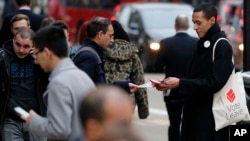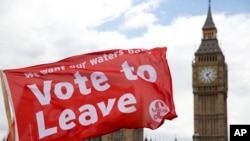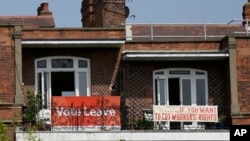Britain will have to pay a price, if it exits the European Union — if for no other reason than to send a warning message to other member countries that may consider leaving the bloc.
In the run-up to Britain’s June 23 referendum, Brussels officials and European lawmakers are warning London it will face tough — if not harsh — negotiations to conclude a post-Brexit free trade deal like Norway’s or Switzerland with the EU.
‘Leave EU’ now leading polls
Attitudes have hardened towards Britain among European leaders as British opinion polls in recent days have shown a surge in support for the ‘Leave’ campaign putting it ahead of the "Remain" camp by as much as six percent. In briefings to reporters, EU officials appear much less restrained in their remarks about a possible Brexit, insisting Britain will be the greater loser and that Europe’s most reluctant member needs the EU more than the pact needs the British.
The EU is Britain's biggest trading partner.
“It has always been a half-hearted member and it has been increasingly a disruptive one; maybe now is the time for it to go,” one senior EU Commission official told VOA.
With Wednesday night’s street clashes between English football fans attending the Euro 2016 soccer tournament and the riot police in the French city of Lille in mind, he added: “Rather like the French police, we are getting tired of the flare-ups and drama.”
European leaders tread lightly in comments
European leaders have been careful in their comments about the British referendum on EU membership in recent weeks, mainly restricting their comments to a wish that Britain remains a member.
This has been partly at the urging of Downing Street, which has feared overt intervention in the increasingly acrimonious British debate would foment public anger at being told what to do by foreigners. U.S. President Barack Obama’s plea “as a friend” for Britain to remain a member during an April visit to London was reckoned by both camps to have had a detrimental impact on the Remain campaign.
But with the apparent surge in support for a Brexit, which has sent the pound reeling and wiped $140 billion off the value of Britain’s top 100 companies in the last four days of trading, EU jitters are turning to frustration, even anger.
Some saying ‘good riddance’
“They never wanted to be with us,” said Jo Leinen, a German member of the European Parliament. “There will be problems with them, if they stay in because it [the referendum] won’t clarify what kind of relationship they want with Europe.”
Polish Euro lawmaker Jacek Saryusz-Wolski acknowledged the EU may be economically poorer with a Brexit and said he would regret the loss of Britain as a powerful powerbroker between Paris and Berlin but added the greater loser would be Britain, which “would be committing an act of self-harm.” He calculates the Brexit argument will win out on June 23.
European Commission President Jean-Claude Juncker, who started to be more openly critical of Britain two weeks ago saying the British people would be treated as “deserters” if they leave, has been holding daily conference calls with the EU’s national leaders to plot contingency plans for a Brexit.
Officials with his office told VOA there is a growing up-swell among European leaders — as well as members of the European parliament — for the EU to be tough with Britain in any post-Brexit talks for a free trade deal.
No special deals
Both Norway and Switzerland have special deals with the EU. They have to contribute to the EU budget and agree to free movement of EU citizens. The EU Commission expects Britain, in the event of an exit, to demand a deal that would allow waivers when it comes to a budgetary contribution and free movement. “That’s just not going to happen,” said a Commission official. “We will be in the driving seat and not them,” he added.
Britain’s pro-"Remain" Economist magazine, which enjoys excellent political connections in Brussels, has warned also that post-Brexit relations between the EU and Britain will likely be torrid. In a plea for British voters to opt to stay in the European Union, the magazine warned that without a trade deal with the rest of Europe, “Britain’s access to the EU would not be as good, particularly for services, the area where British trade is strongest.”
It dismissed "Leave" campaign arguments that the EU will still want to sell goods to Britain, saying, “The EU will not want to offer Britain a special deal, for fear of encouraging Leavers and discouraging Remainers in other countries.”
Forty-four percent of British exports go to the European Union, and nearly half of all foreign direct investment into Britain comes from Europe.
Britain’s "Leave" campaigners dismiss the tougher talk emanating from Brussels as an attempt at scare-mongering, part of what they call Project Fear. Others say the threats are an example of EU bravado.
The impact of a Brexit on both the European Union and Britain would be widespread and drawn-out, said analysts. The actual legal process of London leaving the bloc would take at least two years. "Leave" campaigners said that during that time period Britain will have time to conclude a free trade deal with the EU, avoiding heavy tariffs on goods. But leaving the European pact and shaping new agreements with EU countries could take 10 years, especially if relations between Brussels and London are fraught, argued Gregor Irwin, chief economist at Global Counsel, a political risk consultancy.







